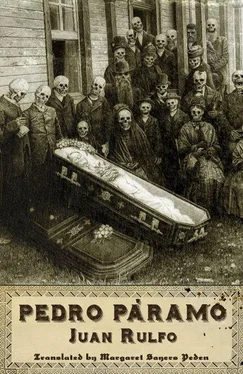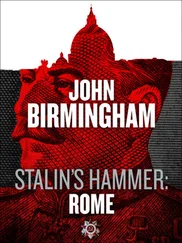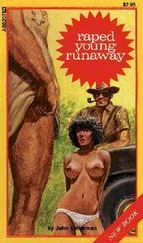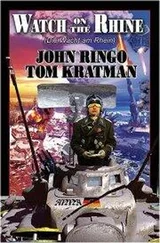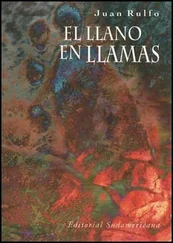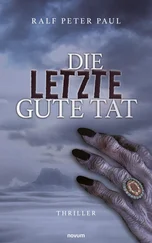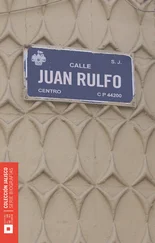“You know how strange they talk up there, but you can understand what they’re saying. I wanted to tell them that it was just my stomach, all dried up from hunger and nothing to eat, but another one of those saints took me by the shoulders and pushed me to the door. ‘Go rest a while more on earth, my daughter, and try to be good so that your time in purgatory will be shortened.’
“That was my ‘bad dream,’ and the one where I learned I never had a son. I learned it very late, after my body had already shriveled up and my backbone jutted up higher than the top of my head and I couldn’t walk anymore. And to top it off, everyone was leaving the village; all the people set out for somewhere else and took their charity with them. I sat down to wait for death. After we found you, my bones determined to find their rest. ‘No one will notice me,’ I thought. ‘I won’t be a bother to anyone.’ You see, I didn’t even steal space from the earth. They buried me in the grave with you, and I fit right in the hollow of your arms. Here in this little space where I am now. The only thing is that probably I should have my arms around you. You hear? It’s raining up there. Don’t you hear the drumming of the rain?”
“I hear something like someone walking above us.”
“You don’t have to be afraid. No one can scare you now. Try to think nice thoughts, because we’re going to be a long time here in the ground.”
At dawn a heavy rain was falling over the earth. It thudded dully as it struck the soft loose dust of the furrows. A mockingbird swooped low across the field and wailed, imitating a child’s plaint; a little farther it sang something that sounded like a sob of weariness and in the distance where the horizon had begun to clear, it hiccupped and then laughed, only to wail once more.
Fulgor Sedano breathed in the scent of fresh earth and looked out to see how the rain was penetrating the furrows. His little eyes were happy. He took three deep gulps, relishing the savor, and grinned till his teeth showed.
“Ahhhh!” he said “We’re about to have another good year.” And then added: “Come on down, rain. Come on down. Fall until you can’t fall anymore! And then move on.
Remember that we worked the ground just to pleasure you.”
And he laughed aloud.
Returning from its survey of the fields, the mockingbird flew past him and wailed a heartrending wail.
The rain intensified until in the distance where it had begun to grow light the clouds closed in, and it seemed that the darkness that had been retreating was returning.
The huge gate of the Media Luna squealed as it swung open, wet from the moist wind.
First two, then another two, then two more rode out, until two hundred men on horseback had scattered across the rainsoaked fields.
“We’ll have to drive the Enmedio herd up past where Estagua used to be, and the Estagua cattle up to the Vilmayo hills,” Fulgor Sedano ordered as the men rode by. “And hustle, the rain’s really coming down!”
He said it so often that the last to leave heard only, “From here to there, and from there, farther on up.”
Every man of them touched the brim of his hat to show that he had understood.
Almost immediately after the last man had left, Miguel Paramo galloped in at full tilt and without reining in his horse dismounted almost in Fulgor’s face, leaving his mount to find its own way to the stall.
“Where’ve you been at this hour, boy?”
“Been doing a little milking.”
“Milking who?”
“You can’t guess?”
“Must have been that Corotea. La Cuarraca. She’s the only one around here likes babies.”
“You’re a fool, Fulgor. But it’s not your fault.”
And without bothering to remove his spurs, Miguel went off to find someone to feed him breakfast.
In the kitchen Damiana Cisneros asked him the same question:
“Now where’ve you been, Miguel?”
“Oh, just around. Calling on the mothers of the region.”
“I didn’t mean to rile you, Miguel. How do you want your eggs.”
“Could I have them with a special side dish?”
“I’m being serious, Miguel.”
“I know, Damiana. Don’t worry. Listen. Do you know a woman named Dorotea? The one they call La Cuarraca.
“I do. And if you want to see her, you’ll find her right outside. She gets up early every morning to come by here for her breakfast. She’s the one who rolls up a bundle in her rebozo and sings to it, and calls it her baby. It must be that something terrible happened to her a long while back, but since she never talks, no one knows what it was. She lives on handouts.”
“That damned Fulgor! I’m going to give him a lick that’ll make his eyes whirl.”
He sat and thought for a while, wondering how the woman might be of use to him.
Then without further hesitation he went to the back kitchen door and called Dorotea: “Come here a minute, I’ve got a proposition to make you,” he said.
Who knows what deal he offered her; the fact is that when he came inside he was rubbing his hands.
“Bring on those eggs!” he yelled to Damiana. And added: “From now on, I want you to give that woman the same food you give me, and if it makes extra work, it’s no problem of mine.”
In the meantime, Fulgor Sedano had gone to check the amount of grain left in the bins. Since harvest was a long way off, he was worried about the shrinking supply. In fact, the crops were barely in the ground. “I have to see if we can get by.” Then he added: “That boy! A ringer for his father, all right, but he’s starting off too early. At this rate, I don’t think he’ll last. I forgot to tell him that yesterday someone came by and said he’d killed a man. If he keeps up like this…”
He sighed and tried to imagine where the ranch hands would be by now. But he was distracted by Miguel Paramo’s young chestnut stallion, rubbing its muzzle against the corral fence.
“He never even unsaddled his horse,” he thought. “And he doesn’t intend to. At least don Pedro is more reliable, and he has his quiet moments. He sure indulges Miguel, though. Yesterday when I told him what his son had done, he said, ‘Just think of it as something I did, Fulgor.
The boy couldn’t have done a thing like that; he doesn’t have the guts yet to kill a man. That takes balls this big.’ And he held his hands apart as if he was measuring a squash. ‘Anything he does, you can lay it on me.’”
“Miguel’s going to give you a lot of headaches, don Pedro. He likes to wrangle.”
“Give him his head. He’s just a boy. How old is he now? Going on seventeen, Fulgor?”
“About that. I can remember when they brought him here; it seems like yesterday. But he’s wild, and he lives so fast that sometimes it appears to me he’s racing with time. He’ll be the one to lose that game. You’ll see.”
“He’s still a baby, Fulgor.”
“Whatever you say, don Pedro; but that woman who came here yesterday, weeping and accusing your son of killing her husband, was not to be consoled. I know how to judge grief, don Pedro, and that woman was carrying a heavy load. I offered her a hundred and fifty bushels of maize to overlook the matter, but she wouldn’t take it. Then I promised we’d make things right somehow. She still wasn’t satisfied.”
“What was it all about?”
“I don’t know the people involved.”
“There’s nothing to worry about, Fulgor. Those people don’t really count.”
Fulgor went to the storage bins, where he could feel the warmth of the maize. He took a handful and examined it to see whether it had been infested with weevils. He measured the height in the bins. “It’ll do,” he said. “As soon as we have grass we won’t have to feed grain anymore. So there’s more than enough.”
Читать дальше
